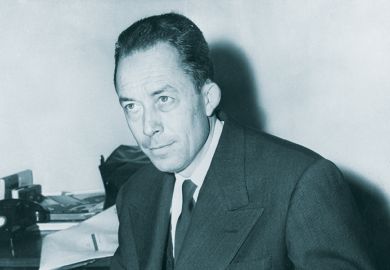In the history of world literature, Joseph Conrad is probably a unique figure. It is extraordinary enough that a writer, after a full naval career, should decide to write in his third language (fluent in Polish and French, Conrad started to learn English only when he was 20), but to go on to become one of the greatest literary stylists in English seems fantastical.
However, it seems to make more sense when we read the story of Conrad's own life and discover that it really was as adventurous and dramatic as his fiction. Few novelists have commanded the respect of writers as diverse as V. S. Naipaul and Harold Pinter, but that is not to say that Conrad is uncontroversial. Although Heart of Darkness may be explicitly anti-colonial, it does not mean that it cannot be viewed as, in Chinua Achebe's famous interpretation, racist. Conrad himself understood that "truth" is never fixed but always elusive and ambiguous. In the light - or rather the misty glow - of this, we realise that it is Conrad's style that simultaneously protects and problematises his work.
Conrad's abiding presence is sometimes astonishing. The front cover of the current official PlayStation magazine heralds the digital game Resident Evil 5 with the slogan "the horror, the horror". Although the popularity of the phrase owes much to Marlon Brando's utterance in the film Apocalypse Now , the root source is Conrad. Conrad's haunting 1890s words resonated throughout the 20th century and still echo, alas, in the 21st.
Conrad continues to be alarmingly relevant, although we sometimes wish he were not. The Secret Agent (1907) takes as its focus a farcical act of terrorism and is based on a true case in 1890s London. However, Conrad's ironic narrative makes the story feel more contemporary. This Edwardian novel seemed acutely relevant after 9/11 and 7/7 and seems even more prescient after the recent Glasgow Airport fiasco.
The Secret Agent abounds with, in all senses, terror. Take Conrad's potential suicide bomber: a chilling nihilist who wanders through London with a bomb strapped to his body, dreaming of a device that could annihilate multitudes, not just a small, urban crowd. Conrad captures the appalling cruelty of human potential that seems to cast a long, depressing shadow of relevance, whether we look at Auschwitz or Abu Ghraib.
However, Conrad, so often painted as utterly pessimistic, could also celebrate altruism and empathy - never in those who boast of possessing such qualities, but rather in the quiet corners of human kindness that bloom, albeit with great fragility, in a context of despair.
This year marks the 150th anniversary of Conrad's birth, and within this rich era of Conrad studies, Zdzislaw Najder's Joseph Conrad: A Life makes a welcome return in a revised edition nearly 25 years after its first appearance in English.
Najder is himself a figure with a remarkable life. Banished from academia by the communist regime in Poland and eventually sentenced to death in absentia when he became the director of the Polish service of Radio Free Europe, he understands the tumult of history in a place such as Poland, which remained as troubled in the 20th century as it was during Conrad's life 100 years before. As the pre-eminent Polish Conrad scholar, Najder is well-placed to undertake the examination of Conrad's formative years. As he states, in the case of Conrad, biography is a study not of psychology but of culture, and the volume provides an extraordinary sweep that fulfils this ambition.
Najder's book is more than a revision. A quarter of the revised edition is new material; hence the change in title from A Chronicle in 1983 to A Life . He uncovers new material on Conrad's family and his naval career. He also succeeds in further developing aspects of biographical and historical analysis by taking advantage of Eastern European archives that the Cold War had kept closed. Whether looking at Conrad's global voyages or his literary endeavours and acquaintanceships, Najder's work is impeccably structured, scrupulously referenced and compellingly written. He also succeeds in the twin challenges of analysing concrete facts and endeavouring to fill the many gaps in Conrad's life story.
Najder's original version of this volume was instantly a key work in Conrad studies, but it was also a superb example of accessible biographical writing. This revised edition makes his achievement even more significant. In short, a great work has become even greater.
Richard Hand is professor of theatre and media drama, Glamorgan University. He is the author of The Theatre of Joseph Conrad: Reconstructed Fictions (2005).
Joseph Conrad: A Life
Author - Zdzislaw Najder
Publisher - Camden House
Pages - 832
Price - £30.00
ISBN - 9781571133472
Register to continue
Why register?
- Registration is free and only takes a moment
- Once registered, you can read 3 articles a month
- Sign up for our newsletter
Subscribe
Or subscribe for unlimited access to:
- Unlimited access to news, views, insights & reviews
- Digital editions
- Digital access to THE’s university and college rankings analysis
Already registered or a current subscriber? Login



